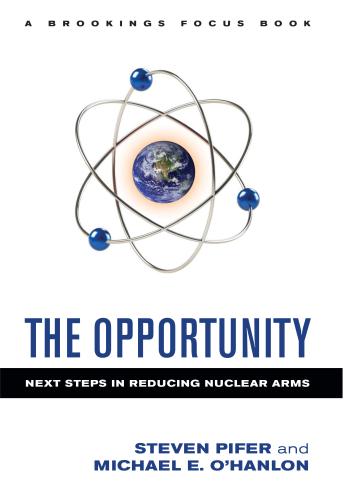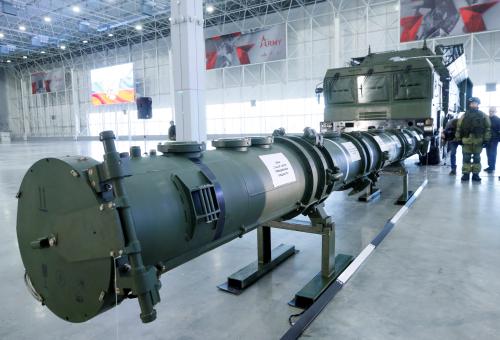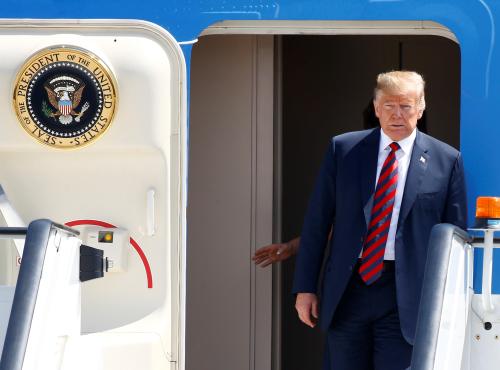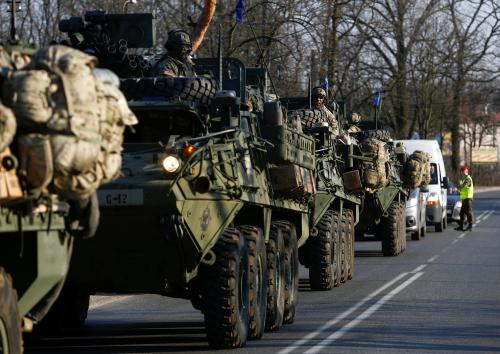The world fortunately got through the Cold War without the U.S.-Soviet confrontation going hot. A big part of the reason was the continued engagement of the United States in Europe after World War II, its launch of NATO, and support—albeit at times half-hearted—for the European Union’s development. Those actions have helped keep peace and stability in Europe for 70 years.
Donald Trump is undoing that.
Mishandling Europe
The president’s mishandling of the May 25 NATO meeting in Brussels was astonishing, especially in that he committed unforced errors. Most strikingly, he declined to publicly reaffirm Article 5, the heart of the 1949 NATO treaty in which allies agreed, “an armed attack against one or more of them…shall be considered an attack against them all.” Administration officials, including Mr. Trump’s national security adviser and National Economic Council director in the May 30 Wall Street Journal, sought to affirm the U.S. commitment to Article 5, but they only make up partly for the president’s ringing public silence.
To be sure, as Michael O’Hanlon recently pointed out, Article 5 has a degree of ambiguity, leaving it up to each ally to decide what action it deems necessary in response to an attack. That is precisely why every American president, up until Mr. Trump, gave robust and unqualified support for Article 5—to ensure that no potential adversary would believe it could attack a NATO member and not face an overwhelming response, including from the alliance’s largest military power. We want that potential adversary to believe that if it steps one foot into NATO territory, that means war. That will keep it from taking that step.
Mr. Trump’s decision not to support Article 5 publicly undercuts that certainty of U.S. response. That brings risk. In a crisis, might the Kremlin miscalculate and decide on a military action against a NATO member, believing that the United States would not respond? With U.S. troops deployed in Poland and the Baltic states, such a miscalculation would put their lives in jeopardy.
The president also erred in his handling of the defense-spending question. He is right that NATO allies should increase their spending. Indeed, following Russia’s aggression against Ukraine, allied leaders at their September 2014 summit reaffirmed the target of two percent of gross domestic product, to be achieved no later than 2024. Most allies had begun increasing their spending even before Mr. Trump took office, though he can take some credit.
However, was hectoring his NATO counterparts in public the smart way to advance his goal? Especially against the backdrop of the Article 5 memorial, a jagged piece of steel from the north tower of the World Trade Center? That commemorates the only time that NATO has invoked Article 5—to defend the United States in the aftermath of the 9/11 attacks.
A smarter approach would have publicly acknowledged that, following NATO’s invocation of Article 5, more than 1,000 European and Canadian soldiers have died fighting in Afghanistan alongside their American comrades-in-arms, and saved the hectoring for the private dinner that followed. Washing dirty linen in public could prove counterproductive.
Picking a Fight with Merkel
German Chancellor Merkel appeared to draw a conclusion from this (and from discussions at the May 26-27 G7 summit). On May 28, she said, “we Europeans must really take our fate into our own hands.” Granted, this was a campaign rally aimed primarily at a German audience, and Mr. Trump is unpopular in Germany, but Ms. Merkel knew her words would be heard overseas.
How did the president respond? With one of his characteristically undisciplined tweets:
We have a MASSIVE trade deficit with Germany, plus they pay FAR LESS than they should on NATO & military. Very bad for U.S. This will change
— Donald J. Trump (@realDonaldTrump) May 30, 2017
The weight of Germany in European Union ranks will only grow with Britain’s departure. Does it make sense to pick a fight with the German chancellor, who shares U.S. values and over the past several years has steered the European Union in the direction that Washington hoped she would?
A Pivot Point?
Some analysts say we are at a pivot point in U.S.-European relations. In the late 1940s, in the aftermath of World War II, the United States departed from its traditional isolationist policy and chose to stay engaged in Europe, applying its economic might—the Marshall Plan to assist post-war recovery—and military power for Europe’s defense. U.S. engagement aimed to keep the Soviet Union out. It also aimed to help Europeans overcome the animosities, in some cases dating back centuries, that triggered two catastrophic world wars in the first half of the 20th century.
U.S. engagement and support for building the institutions of modern Europe—including the European Union, NATO, the Organization for Economic Cooperation and Development and the Organization for Security and Cooperation in Europe—have helped that continent enjoy an unparalleled period of peace and stability. That was and remains in the U.S. interest.
Europeans understand that they need to bear a larger share of the burden, and that they may have to carry at least part of it on their own. That also is in the U.S. interest. But does it make sense for Washington to say, “you’re on your own no matter what—particularly if you don’t pay us ‘back dues?’”
The Brookings Institution is committed to quality, independence, and impact.
We are supported by a diverse array of funders. In line with our values and policies, each Brookings publication represents the sole views of its author(s).











Commentary
Is Trump undoing trans-Atlantic relations?
May 31, 2017